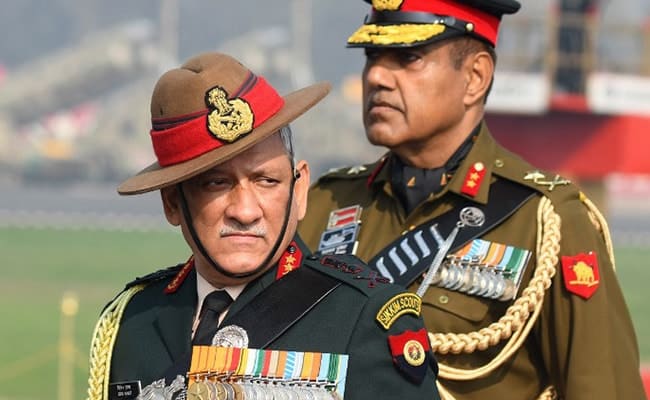A round of golf, a gala wine banquet, and ceremonies are provided for attendees of Gen. Bipin Rawat’s desire to decolonize the Indian military. He was successful militarily, but due to resistance from his own, he was unable to transform the imperial legacy military into contemporary theater commands.
Gen Bipin Rawat died on December 8 in 2021 in a helicopter crash in Tamil Nadu`s Coonoor.
Gen. Bipin Rawat met P.M Modi When China PLA Began Moving towards Torsha nullah on the Doklam Plateau
According to the Raisina Hill legend, on the day in June 2017 when the Chinese PLA began moving towards Torsha nullah on the Doklam Plateau at the India-Bhutan-China trijunction with construction vehicles and road-building equipment, National Security Advisor Ajit Doval, then-foreign secretary and current foreign minister S Jaishankar, and then-Army Chief and later Chief of Defence Staff(CDS) Gen Bipin Rawat met with Prime Minister Narendra Modi.
The trio told the PM that the PLA’s goal was to get to Jampheri Ridge, define the border on its own at the triangular intersection, and exert pressure on India’s “Chicken Neck” or Siliguri Corridor. The PM reportedly asked them what they thought needed to be done. The trio retorted that it was important to halt the Chinese.

(File Picture)
Apparently in response, PM Modi asked, “What are we waiting for? The two Garhwali brothers drove the Indian Army up to the Jhampheri ridge and prevented the PLA from crossing the Torsha nullah that divided the plateau on the same day that Jaishankar diplomatically expressed India’s grave worries to Beijing and Thimpu.
By August 2020, taking advantage of the rapidly spreading Covid pandemic, which had its origins in Wuhan in China, the PLA had earlier in May infringed upon Kugrang Nullah, Gogra-Hot Springs, and the north banks of Pangong Tso.
The Indian Army lost 20 soldiers, including Col. Santosh Babu, in a confrontation with the PLA in the Galwan Valley on June 15, 2020, but not before giving the Chinese Army a fatal lesson for redrawing the line unilaterally and imposing the 1959 LAC that India had rejected.
The Garhwali brothers launched an offensive on August 29–31, 2020, to capture heights south of Pangong Tso, Rezang La, and Rechin La, effectively turning the tables on the belligerent PLA after the Chinese refused to reinstate the status quo ante on the Ladakh LAC as of April 2020.
General Rawat, now the CDS, led the offensive in coordination with the then Army and Intelligence Chiefs and with full support from the current External Affairs Minister S Jaishankar.
The deployment of India’s Special Frontier Force (SFF), a highly skilled mountain warfare division made up of exiled Tibetans and operating under the Cabinet Secretariat, was authorized by none other than General Rawat.

The Indian troops were given orders to use force in retaliation if the PLA went up the Rezang La ridge or South Pangong Tso heights while the NSA was in complete control of the operation. The Indian armor actually fired a round of high explosive, long-range tank ammunition to fend off the PLA light tanks. The rest, as they say, is history, and the SFF lesson made the PLA despise India.
One year after Gen. Bipin Rawat and his wife Madhulika perished in a helicopter crash in the Nilgiris, the first CDS is remembered as a true military reformer who valiantly attempted to decolonize the Indian armed forces, particularly the Indian Army. His regiment mate Gen. Anil Chauhan was appointed as the second CDS.
Gen. Rawat, who disliked pomp, ceremony, and red carpets, was criticised by his peers and some serving officers for contesting on issues such as disability benefits, extravagant military canteen benefits, poor military construction, and even playing a round of golf with the Indian Army on one of the nation’s 195 golf courses.
He assured the armed forces that they would receive the same respect and credibility as a significant portion of the Indian police if they wanted to succeed financially.

The golf course at the 15 Corps headquarters in Srinagar’s Badami Bagh cantonment was dug out by him as Army Chief after officers were accused of showing disrespect to the fallen soldiers whose bodies had fallen on the nearby helicopter pad. He was an ardent golfer who gave up the sport to set a good example for other police officers.
Although the first CDS led by example, he was also courageous enough to speak up to the political establishment, and this approach frequently brought him into difficulties with the establishment. But it had no effect on his attitude or state of mind. He wasn’t an armchair thinker; he was a war commander.
Even though General Bipin Rawat defeated the enemy from Sumdorong Chu to Uri to Doklam to East Ladakh, his own people let him down when he attempted to push for military theatre commands as was required of him as the first CDS.
Although he responded to all of the questions and concerns put forth by the three heads of the armed forces, particularly the head of the Indian Air Force, Gen. Rawat was unable to complete the task during his lifetime because none of the three chiefs wanted to lose their fiefdoms and financial clout.
Gen Chauhan must finish the last task assigned to his deceased friend.
READ: Government widens CDS pool; makes retired 3-star generals eligible













